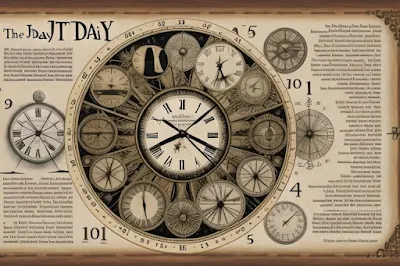The Invention of Days: A Journey Through Time
The concept of days, as we understand it today, has a rich and fascinating history. This article will delve into the origins of how days were invented and the evolution of our modern understanding of time.
The Ancient Babylonians and the Invention of Days
The ancient Babylonians are credited with the invention of the 24-hour day. They were the first to divide both the day and night into 12 equal hours, later separating each hour into 60 minutes and the minutes into 60 seconds. These divisions of time were based on the movements of the Sun and Earth, but they also had their roots in the Babylonians’ numbering system.
Unlike our standard decimal system today based around grouping numbers in ‘10s’, the Babylonians used duodecimal (base 12) and sexagesimal (base 60) numeral systems. It’s believed the system likely originated from ancient peoples using their thumbs as a pointer, and counting by using the three jointed parts on the other four fingers. It was logical for them to divide their time using this same mathematical system.
The Naming of Days
The days of the week were named for the classical planets. This naming system persisted alongside an “ecclesiastical” tradition of numbering the days in ecclesiastical Latin beginning with Dominica (the Lord’s Day) as the first day.
The Roman Calendar and the Modern Day Calendar
The calendar that we use today originated from the Roman calendar dated 753 BC. The names of months of the modern day calendar have been derived from the Roman calendar. The Roman calendar was a lunar one comprising ten months and 61 days of winter not assigned to any month. Unlike today, the Roman calendar began with March.
Conclusion
The invention of days is a testament to the ingenuity of ancient civilizations. Their understanding of the natural world, combined with their mathematical knowledge, led to the creation of a system that has stood the test of time. Today, we continue to use this system, a constant reminder of our historical roots. As we move through our days, let us appreciate the rich history that has shaped our understanding of time.

Comments
Post a Comment